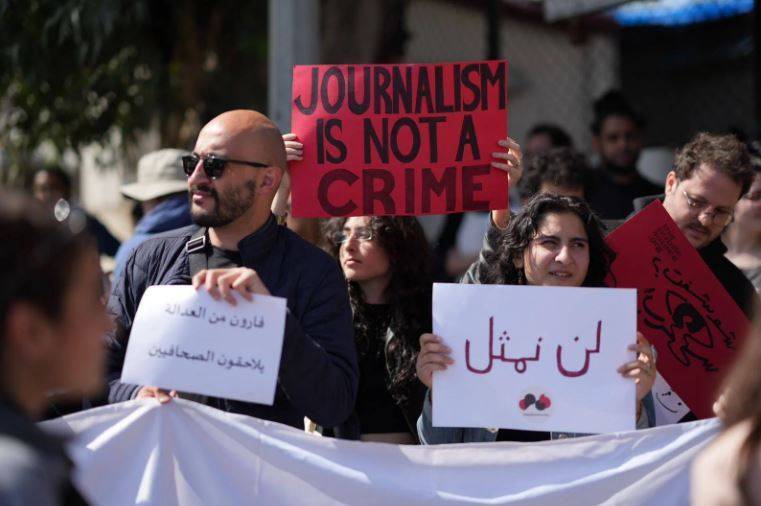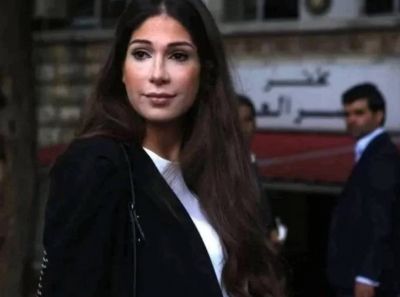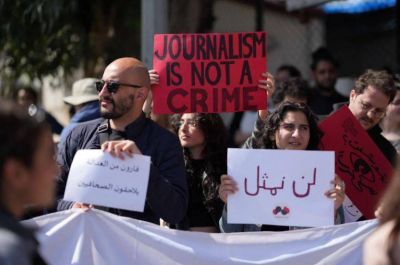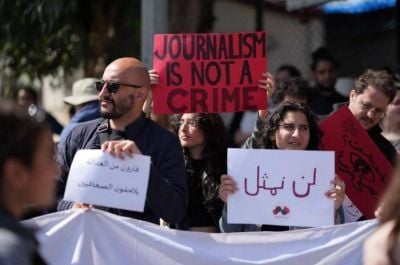
Protesters during a sit-in in solidarity with journalist Lara Bitar, in front of the Anti-Cybercrime Bureau in Hazmieh, on April 6, 2023. (Credit: Mohamad Yassin/L'Orient Today)
BEIRUT — Amnesty International launched a new campaign on Tuesday, #MyOpinionIsNotaCrime, which "calls on the Lebanese Parliament to abolish all laws that criminalize insult and defamation."
In a statement published Tuesday, Amnesty stated that "the Lebanese authorities must immediately halt all prosecutions of journalists, human rights defenders, activists, and others who are critical of state officials."
Amnesty and other organizations have documented an "increase in freedom of expression-related investigations and prosecutions" in Lebanon following the 2019 popular uprising. According to Amnesty, 75 individuals, including 20 journalists, were summoned in relation to defamation and insult charges between Oct. 17, 2019 and June 24, 2020.
'Repressive criminal provisions'
Today, high-ranking officials are increasingly using "repressive criminal provisions" against critics. According to Amnesty's statement, "the organization interviewed 10 individuals who have been summoned for interrogation this year or are currently on trial over criminal defamation and insult complaints because of their peaceful criticism."
In March, journalist and co-founder of the independent online media platform Megaphone Jean Kassir was intercepted by State Security while driving. The agency summoned him for "interrogation without informing him of the reason for the summons." It transpired that Lebanon’s top public prosecutor, Ghassan Oueidat, had filed a criminal defamation suit against him.
Editor-in-chief of the Public Source website, Lara Bitar, in March was also summoned for interrogation. Bitar's summons came via the Cybercrimes Bureau of the Internal Security Forces (ISF) and was "based on a criminal defamation complaint submitted by a prominent Lebanese political party." The motivation for the complaint was an article that alleged the Lebanese Forces committed environmental crimes during and after the 1975-90 Lebanese Civil War.
The Dima Sadek case
On July 10, journalist Dima Sadek was sentenced by a criminal court to a year's imprisonment for a crime of opinion.
Amnesty International’s deputy director for the Middle East and North Africa, Aya Majzoub, said on Tuesday that "Dima Sadek’s case is a travesty and an illustration of how archaic criminal laws are being weaponized to punish or silence dissent."
Majzoub added that "Lebanon’s insult and defamation laws are designed to protect those in power from all forms of criticism."
Moreover, in the same month, Amnesty noted that "the Cybercrimes Bureau summoned Gina al-Chammas, the president of a non-profit called Lebanon Certified Anti-Corruption Managers, for interrogation following a criminal defamation complaint filed against her by a former minister over statements she made about his alleged corrupt activities."
Amnesty added that "the officials who filed insult and defamation charges used those laws as a means of retaliation, harassment, and intimidation against their critics .... In addition, the security agencies that summoned and interrogated those accused of 'insult' or defamation failed to follow standard procedures that safeguard the defendants' due process rights and engaged in intimidating behavior, such as threatening the individuals with detention or pressuring them to sign pledges stating that they would stop criticizing the complainant or committing to remove the allegedly defamatory content."
"Insult" and defamation laws in Lebanon are included in the Penal Code, the Publications Law, and the Military Code of Justice. These provisions allow for prison sentences of up to three years for violations of these laws.
Amnesty called for the repeal of provisions that criminalize "“insulting” public officials or institutions, a vague and subjective provision which is not recognized as a crime under international law."
Finally, Majzoub said that the new campaign "calls on the Lebanese authorities to abolish articles in the Penal Code, the Publications Law and the Military Code of Justice that criminalize insults and to replace defamation articles with new civil provisions. Such reforms would balance the protection of people’s reputations from undue harm while ensuring the protection of the right to freedom of expression".
According to the 2023 World Press Freedom Index — which evaluates the environment for journalism — published by "Reporters Without Borders," Lebanon was ranked 119 among 180 countries. This means that the environment for journalism in Lebanon is difficult.


